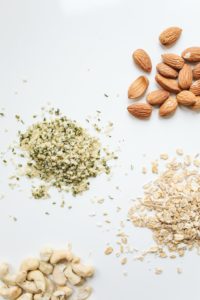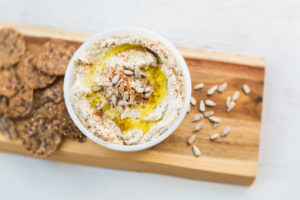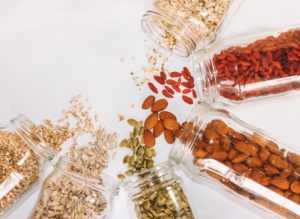Welcome to
the Blog
Replete Wellness
RW
Seed Cycling For Hormones

We wholeheartedly believe that food is one of the most powerful forms of medicine (herbs definitely included in this category). The food you eat is a messenger that gives your body instructions on how to operate. Functional foods, eaten at the right times, in the right quantities, can lead to dramatic improvements to your overall health. This is especially true when it comes to female hormones and reproduction. Foods like conventional dairy and sugar can mess with our lady hormones, while foods like sesame seeds, flax seeds and pumpkin seeds can be used to help you optimize your hormone levels.
The ancient hormone-supportive food therapy called seed cycling is one of our go-to tools to naturally regulate cycles. Seed cycling can naturally boost estrogen levels when they should be highest in the first part of the female reproductive cycle (follicular phase) and progesterone levels in the second half (aka luteal phase). While there’s yet to be a placebo-controlled trial on the use of nuts and seeds to boost hormone production (which pharmaceutical company would fund that study?) it remains a useful functional food therapy that we often prescribe as an adjunct to personalized herbal or bio-identical hormonal treatments. Seed cycling is safe, easy and Replete patients consistently report that it makes a difference in their overall hormonal health. There’s even a study from the the Journal of Clinical Endocrinology & Metabolism which shows that eating the seeds included in this seed cycling protocol results in an improve progesterone to estrogen ratio, regular ovulation and healthier hormonal cycles.
In hormonally healthy women the menstrual cycle should be regular, easy and symptom-free, with no need for additional interventions like painkillers or birth control pills. Unfortunately, stress, poor dietary choices, digestive issues and environmental toxins all contribute to hormonal problems and we may be able to offset some of this damage to our endocrine system by simply adding a few tablespoons of nuts and seeds to the diet;
How to ‘Seed Cycle’
Follicular Phase (days 1 – 14 of your female hormone cycle): This is the estrogen dominant phase, there should be very little testosterone and no progesterone present in the first half of your cycle while you’re body is building up endometrial tissue and preparing for ovulation. Flax seeds and pumpkin seeds support healthy estrogen production in the first half of your cycle because they contain high levels of lignans – plant polyphenols that help to modulate estrogen levels. They also contain a good dose of omega 3 fatty acids (flax) and magnesium (pumpkin) to help your body produce healthy hormones.
Eat the following seeds daily, ideally 1 tablespoon of each:
- 1 tablespoon of flax seeds/day
- 1 tablespoon of pumpkin seeds/day
Luteal phase (days 15 – 28): Progesterone is the dominant hormone during the luteal phase and women with irregular cycles or difficult periods are often deficient in this key reproductive hormone. Sesame seeds and sunflower seeds are to be eaten in the second half of your cycle since they are great food sources of zinc (sesame seeds) and vitamin E (sunflower seeds) – two nutrients that have been shown to stimulate progesterone production:
- 1 tablespoon sesame seeds
- 1 tablespoon sunflower seeds
- Evening primrose oil: 1000mg daily
Seed Cycling Tips & Tricks
- Check in with your doctor: While seed cycling can be a wonderful addition to your treatment plan it’s unlikely to fix severe hormonal imbalances. If your hormonal symptoms are extreme (we’re talking excessive bleeding or relationship-ruining mood swings) it’s important to check in with your Integrative doctor or GP to ensure there isn’t a more serious underlying reason for your more hormonal imbalance.
- Keep a journal to track your shifts throughout the month: seed cycling can be a wonderful way to help you connect with your female cycle and journalling allows you track any changes to your hormonal health.
- Support your gut: the majority of hormone detoxification actually occurs in the intestines, which is why it’s so important to have an efficient digestive system. Make sure you’re going to the washroom daily and balance your digestive flora with probiotics and fermented foods (your Naturopathic doctor will be able to direct you to the right probiotic prescription).
- Stay active and move your body daily to encourage proper hormone elimination and detoxification.
- Grind your seeds: This will help your body digest them more easily.
- Minimize exposure to toxins in your daily life: ditch the plastic and switch to stainless steal or glass containers for water and food storage. I also encourage my patients to eat organic food and switch to natural beauty products in order to limit their exposure to endocrine-disruption chemicals.
- Sprinkle your ground seeds into smoothies, oatmeal or yogurt. Nuts are delicious on-top of salads or a plate of roasted vegetables.
- Eat more brassicas (kale, sprouts, broccoli, cauliflower): these vegetables contain compounds which support estrogen detoxification and taste delicious drizzled with a simple tahini sauce (1 tbs tahini paste – from sesame seeds + the juice of 1/2 a lemon + 1 tbs olive oil).
Seed Cycling Recipes:
Check out our favourite seed cycling recipes from Dr. Sarah’s kitchen.
Follicular Phase Recipes:
- https://www.thisdoctorskitchen.com/flax-paleo-cookie-dough-seed-cycling/
- https://www.thisdoctorskitchen.com/banana-flax-blender-muffins/
- https://www.thisdoctorskitchen.com/lemon-blueberry-keto-flax-muffins/
- https://www.thisdoctorskitchen.com/hormone-balancing-flax-muesli/
Luteal Phase Recipes:
- https://www.thisdoctorskitchen.com/strawberry-coconut-luteal-balls/
- https://www.thisdoctorskitchen.com/lemon-coconut-luteal-balls/
- https://www.thisdoctorskitchen.com/sweet-tahini-dip/

If you have more questions about natural hormonal support, or if you live in the Ontario and would like to work with Dr. Sarah to develop your personalized hormone balancing protocol you can book you initial virtual consult with Dr. Sarah here.
References:
- http://www.eje-online.org/content/94/1/99
- https://www.ncbi.nlm.nih.gov/pubmed/8077314
- https://academic.oup.com/jcem/article-abstract/8/11/982/2720300?redirectedFrom=fulltext
- https://www.ncbi.nlm.nih.gov/pubmed/2826899
- https://www.ncbi.nlm.nih.gov/pubmed/28657580
This information is not intended as a substitute for the advice provided by your Naturopathic doctor or primary care physician. Do not use the information in this document for diagnosing or treating a health problem or disease. Always speak with your Naturopathic doctor before taking any medication or nutritional or herbal or using any treatment for a health problem. If you have or suspect that you have a medical problem, contact your health care provider promptly. Do not disregard professional medical advice or delay in seeking professional advice because of something you have read online.

Wow, wonderful blog layout! How long have you been blogging for? you make blogging look easy. The overall look of your site is great, as well as the content!